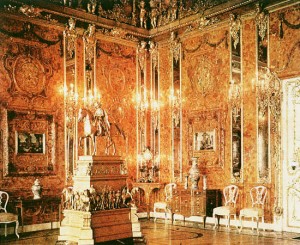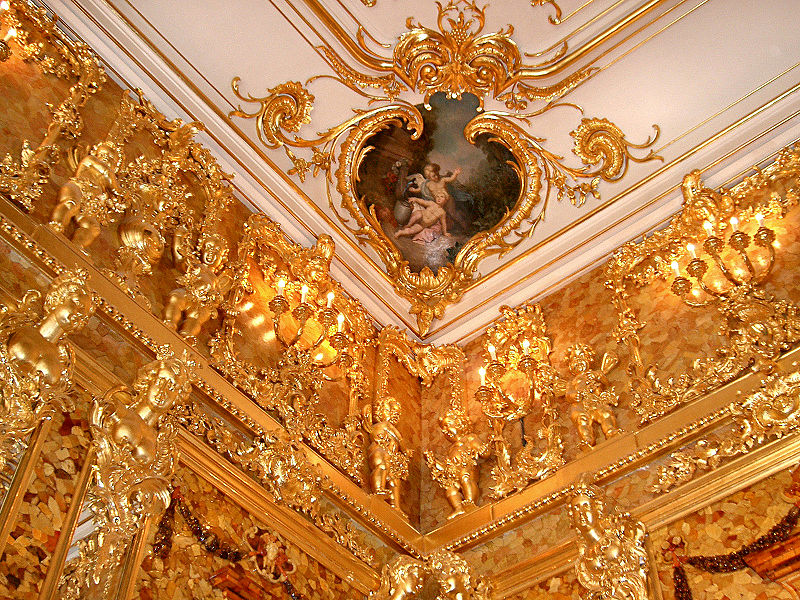Invariably, when I tell people about my dissertation topic, they reference a show they have seen recently about Nazi Tunnels. Usually they’re referencing this episode of Solving History with Olley Steeds on Discovery.
http://dsc.discovery.com/videos/solving-history-nazi-treasure/
I thought it would be interesting to make a list of connections to the dissertation that I come across throughout this research and writing process. I’ll include links to news stories, TV shows (like the one linked above), or any other research and resources about the topic.
Solving History

The TV show linked above tries to track down the mysteriously missing Amber Room, a room decorated from carved amber and gems, once the pride of Russian czars. It was crafted by Prussian and Russian artists during the first decade of the 1700s, and given as a gift to Russian Czar Peter the Great in 1716. On June 22, 1941, the room was looted by Nazi soldiers as a part of Operation Barbarosa, and set up in the Königsburg (now Kaliningrad) castle museum. The current whereabouts of the Amber Room are unknown. At the close of the war many valuable art treasures were moved to more protective areas. A ship that could have been carrying the Room along with other treasures was sunk by a Soviet submarine. It is possible that the room was destroyed during Allied bombing in 1943.
Olley Steeds, in the Discovery show Solving History, tracks possible leads that the Amber Room may be stored in an abandoned mine shaft in the Czech Republic. Throughout the show, Olley Steeds goes through Nazi hideouts, underground fortresses, and secret tunnels.
Dissertation Relation
Tunnels, mine shafts, caves, and other underground structures had a variety of uses to the Nazis. Many of the most well known tunnels were for looted art and other treasures. Fortunately (I suppose) for me, the less well known causes were for protection of industrial factories. That’s what I’ll be focusing on for the dissertation.
This also brings in the question about public history, especially that used as entertainment. Don’t get me wrong, I think history, or learning about the past, is full of entertainment. And such shows definitely have worth. In the few short minutes I saw of this show, though, I was left wondering how much of it is simply myth hunting in order to make an entertaining show, and how much was trying to figure out what happened in the past. I haven’t seen a whole episode, so I can’t make any judgment calls, but it does bring up the larger issue of the possibility of degrading historical events for entertainment value. I guess the question is, does history and entertainment have a place together? Histertainment, if you will. If you judge by certain cable shows dealing with history, and the many books on the subject at any given book store, I would venture to say yes. Reality, as the saying goes, is often much stranger than fiction.
Sources
http://www.smithsonianmag.com/history-archaeology/world-history/brief_amber.html?c=y&page=1
http://en.wikipedia.org/wiki/Amber_Room
Images from Wikimedia Commons and the Wikipedia article linked above.

Yes, I agree that sometimes entertainment overshadows the reality of life. In fact, don’t get me started on the “reality” shows that have become so popular. Is life so boring, that we have to be entertained constantly? Do we have to sensationalize things in order to put value on them?
Maybe our values are being misplaced and should, instead, be properly placed back on the simple acts of kindness we see, the humble and needed service given freely to others and perpetuating loving relationships with our family and friends.
It was a show on Discovery, by Olly Steeds. I have not seen the “Cities of the Underworld” one, and maybe shouldn’t. 🙂
I have now realized that I will need to focus on just the projects at Porta Westfalica for the dissertation. Any help you can provide on locating documents and other sources is greatly appreciated. In my dissertation, I will try to show that this kind of collaboration (open access to information on a website) is a good and important step for “doing” history.